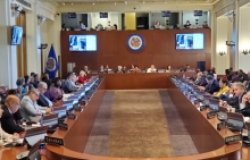#116 Interstate Conflict Behavior and Regional Potential for Conflict in Latin America
By Wolf Grabendorff
Abstract
This paper is based on an analysis of 20 selected bilateral conflicts in Latin America and the Caribbean between 1948 and 1981. It divides the conflict behavior of Latin American states into two distinct periods: from 1948 to 1965, and from 1965 to 1981. The central thesis of the paper is that the absence of conflict in the Western Hemisphere is due more to U.S. hegemony and the willingness of a number of countries to cooperate with the interests of the United States than to any specific peacekeeping efforts of the "inter-American system." Due to the waning of U.S. hegemony since 1965, the heterogeneous development of various nation-states in Latin America has given way to a more traditional conflict behavior which reflects both the increased internal capacity to wage conflict and the growing external interest articulation of Latin American states.
The paper assumes that the overlapping of the East-West conflict and North-South conflict in the region will lead to additionla conflict constellations, which might well transcend bilateral interstate conflict patterns during the 1980s. It discusses the various potentials for further conflict in the region within the framework of a typology of interstate conflicts in Latin America:
- ideological differences which lead to system conflicts
- great-power claims to supremacy, leading to hegemonic conflicts
- border controversies which lead to territorial conflicts
- securing of raw materials, leading to resource conflicts
- differences of economic development which lead to migration conflicts
Related Program

Latin America Program
The Wilson Center’s prestigious Latin America Program provides non-partisan expertise to a broad community of decision makers in the United States and Latin America on critical policy issues facing the Hemisphere. The Program provides insightful and actionable research for policymakers, private sector leaders, journalists, and public intellectuals in the United States and Latin America. To bridge the gap between scholarship and policy action, it fosters new inquiry, sponsors high-level public and private meetings among multiple stakeholders, and explores policy options to improve outcomes for citizens throughout the Americas. Drawing on the Wilson Center’s strength as the nation’s key non-partisan policy forum, the Program serves as a trusted source of analysis and a vital point of contact between the worlds of scholarship and action. Read more










